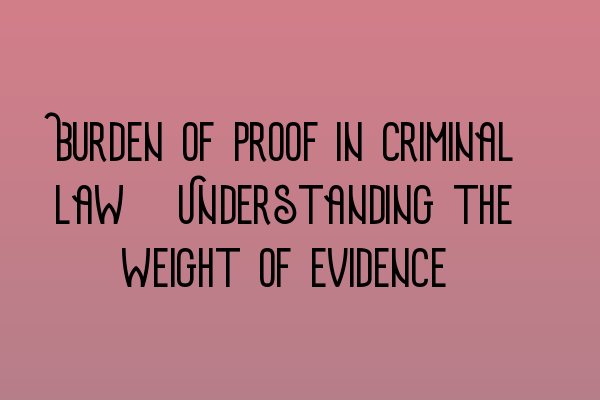Burden of Proof in Criminal Law: Understanding the Weight of Evidence
Welcome to the SQE Criminal Law & Practice Law UK blog! In this article, we will delve into the concept of burden of proof in criminal law and provide you with a comprehensive understanding of the weight of evidence. Understanding the burden of proof is crucial for both legal professionals and individuals seeking to navigate the criminal justice system.
The Importance of the Burden of Proof
The burden of proof is a fundamental principle in criminal law that places the responsibility on the prosecution to prove the guilt of the accused beyond a reasonable doubt. It is a key protection afforded to individuals to ensure fair trials and prevent miscarriages of justice.
As a solicitor, you must fully comprehend the weight of evidence required to meet the burden of proof and effectively represent your clients. Whether you are a seasoned attorney or preparing for the SQE 1 or SQE 2 exams, understanding the burden of proof is essential to your success.
The Standard of Proof: Beyond a Reasonable Doubt
The burden of proof in criminal cases is set at the highest standard: beyond a reasonable doubt. This means that the evidence presented by the prosecution must be so strong and convincing that there is no other logical explanation than the guilt of the accused.
When arguing a criminal case, it is vital to emphasize to the court that any reasonable doubt regarding the accused’s guilt should result in an acquittal. This places the onus on the prosecution to present compelling evidence that eliminates any doubts that may arise.
Key Components of the Burden of Proof
Several key components contribute to the burden of proof in criminal cases:
- Evidential Burden: The prosecution must present sufficient evidence to establish a prima facie case against the accused. This means that the evidence must be credible, reliable, and admissible in court.
- Legal Burden: Once the prosecution has established a prima facie case, the legal burden shifts to the accused to raise a defense or rebut the prosecution’s case. The accused does not have to prove their innocence, but they must cast doubt on the prosecution’s evidence.
- Proof Beyond a Reasonable Doubt: As mentioned earlier, the burden of proof requires the prosecution to present evidence that is so strong that there is no reasonable doubt regarding the accused’s guilt. This is a high threshold to meet, ensuring the protection of the accused’s rights.
Understanding these components allows solicitors to analyze the evidence, identify weaknesses in the prosecution’s case, and mount an effective defense strategy.
Preparing for the SQE Exams
If you are preparing for the SQE 1 or SQE 2 exams, a comprehensive understanding of the burden of proof in criminal law is essential. The SQE exams assess your knowledge of substantive law, procedure, and professional ethics, among other areas.
For SQE 1 preparation, we recommend enhancing your knowledge through courses tailored to the SQE exams. These courses will give you the opportunity to practice your legal skills and test your knowledge with SQE 1 practice exam questions. Engaging with SQE 1 practice mocks FLK1 FLK2 will also allow you to familiarize yourself with the exam format.
When preparing for SQE 2, it is crucial to focus on practical skills and understanding the application of legal principles in real-world scenarios. SQE 2 preparation courses provide invaluable guidance and resources to prepare you for success in these exams.
Stay Updated with SRA SQE Exam Dates
It is equally important to stay informed about the SRA SQE exam dates. Keeping track of exam schedules will allow you to plan your preparation effectively and ensure you are fully prepared when the exams approach.
For the latest information on SRA SQE exam dates, visit our SRA SQE Exam Dates page. Stay ahead of the game and give yourself the best chance of success!
Conclusion
The burden of proof is a central pillar of the criminal justice system. As a solicitor, mastering this concept is crucial to representing your clients effectively. Whether you are preparing for the SQE exams or seeking to deepen your understanding of criminal law, comprehending the weight of evidence required to meet the burden of proof is key.
For SQE 1 practice exam questions and practice mocks FLK1 FLK2, check out our SQE 1 Practice Exam Questions and SQE 1 Practice Mocks FLK1 FLK2 articles.
To ensure you are fully prepared for the SQE exams, explore our SQE 2 Preparation Courses and SQE 1 Preparation Courses. These courses provide comprehensive resources and guidance to help you excel in your legal career.
